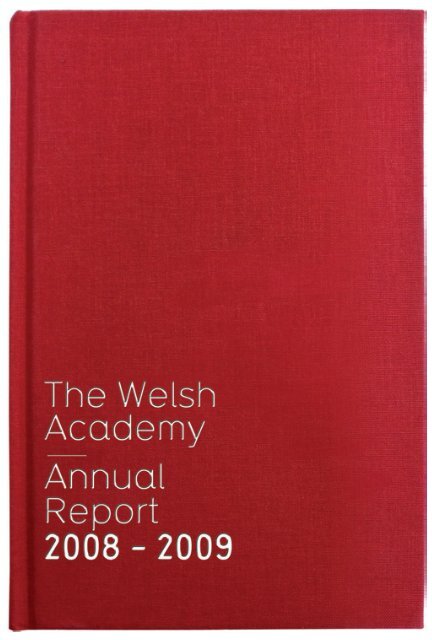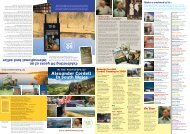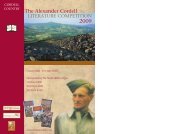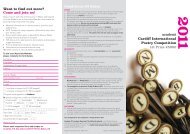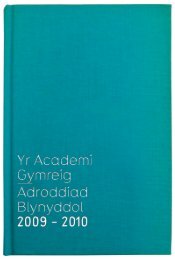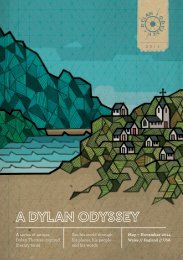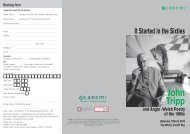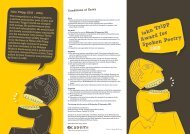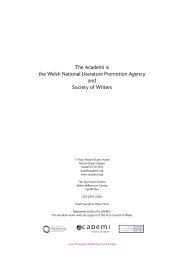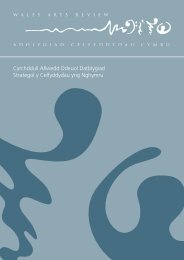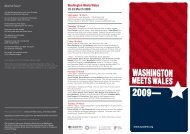You also want an ePaper? Increase the reach of your titles
YUMPU automatically turns print PDFs into web optimized ePapers that Google loves.
Academi is the Welsh National<strong>Literature</strong> Promotion Agencyand Society of Writers.Chief Executive: Peter FinchAcademiMount Stuart HouseMount Stuart SquareCardiff CF10 5FQThe Glyn Jones Centre<strong>Wales</strong> Millennium CentreCardiff Baypost@academi.orgwww.academi.orgwww.writingsquads.orghttp://taliesin.academi.org/029 2047 2266Registered Charity No 506402PhotographyJohn BriggsDewi Silfanws Rhys-JonesNational Museum <strong>Wales</strong>Andrea Bakacsdylunio | design Hoffi.comhybu llênliterature promotion
LiteraryLight in theEconomic DarkWhat happens to literature in a recession?Perversely, it flourishes. When the worldmoves into conflict or runs out of flashyresource, it is often writers who come to therescue. During the great depression of the1930s poetry emerged as a celebrator ofhuman dignity and novelists as providers of analternative to the darkness that wasenveloping the land. When the worldfloundered in post-war exhaustion during the50s it was the writers who steered the spiritback up. Even the much smaller economicdownturn of the early 90s coincided with a risein interest in the book. When it’s bad out therepeople turn within. To engage with literaturecosts so little. Reading encompasses,entertains, elevates. The practise of writingfixes emotion, clarifies difficulty, improvesself-being. Joining in is so simple.<strong>Literature</strong> in <strong>Wales</strong> is in good shape. It’s likethis because we care. <strong>Literature</strong> hereoccupies a far more significant place in theculture than it seems to elsewhere. A recentcount showed that we have almost twice asmany poets per head of population than theydo over the border. For a nation of our size,possessing two national languages (and atleast a half a dozen others of significantsize), our annual publishing outputs aresignificant. 487 titles in Welsh for 2008-2009and 805 in English. And that’s discountingworks from Welsh authors published bymainstream English and American publishinghouses. Our authors are well integrated intothe education system and a large number ofschools and other institutions facilitate visitson a regular basis. Welsh children are farmore likely to have met, been influenced byor worked with a living author than thosebeyond our borders. The <strong>Wales</strong> Book of theYear Awards feature prominently on nationaltelevision. World Book Day each March andNational Poetry Day in October act as a majorfocus for events. We possess a calendar ofliterature festivals the envy of all other homenations. If there was such a thing as acountry of culture for 2008 then the winnerwould have been the one with a dragon onits flag.Academi’s function is to promote literature inboth of our official languages and to assistwith literature in languages which are not.We encourage practice, celebrateexcellence, work with the health andeducation sectors, employ literature as a toolfor social inclusion, and engage withconsumers, both the young and the old. Wepromote our literary achievements amongthose who might otherwise have missedknowing, take literature again to places italways goes as well as to those it has neverbefore reached, and also protect the rights ofwriters and improve their lot.We’ve been doing this in one form or anothersince 1959, when we were formed as YrAcademi Gymreig, the Society of Writers for<strong>Wales</strong>. In 1998 Academi was reconstitutedand enlarged to become the National<strong>Literature</strong> Promotion Agency. The decadethat followed has seen constant growth withlast year being no exception. Society’s needfor literature has been one of the latetwentieth century’s growth points. In allsectors – education, health, social justice,and in literature itself – demand hasoutstripped supply. Recession notwithstanding, that is very much still the case.To weather a storm the traditionallyunderfunded arts need, at very least, tomaintain present budgets. In <strong>Wales</strong>,compared to the needs of Health andEducation, those represent but a tiny sliver ofoverall public spend. It will be Academi’s jobto do what it can to ensure that futureAssembly budgets take this into account.
SomeDifficultiesPersistThe past year has not been one unalloyedstreak of light. Difficulties have persisted. Thetotal resource available for the payment ofauthors has remained largely uninflated.As Academi has noted on a number ofprevious occasions Welsh authors are alltoo often called upon to work for derisoryrates. To see the emergence of a strata ofprofessional writers in <strong>Wales</strong> requires thenation to make available to them work inappropriate quantity and to pay marketrates. Despite constant pressure 2008-2009has seen us move no nearer this target.The problem of author’s copyright in a digitalage continues, with writers divided as to howthey should proceed. Those who wish to seetheir work disseminated as widely as possibleand who seek little or no financial rewardare directly contrasted by the many whoseek to live by what they produce. Boundup as it is with the desire to see our culturemade available to all who seek engagement,resolution to the issue seems as far awayas ever.Success VastlyOutweighs Failure– Some HighlightsThe word ‘some’ is probably inadequatehere. 2008-2009 has been as busy a year asanyone on the Academi staff can remember.Schemes, projects and proposals put intrain in earlier years have come gloriouslyto fruition and in their wake a whole newraft of literature events and activities havecome on stream. The joint venture betweenAcademi and seven south <strong>Wales</strong> Valleyslocal authorities, backed by aid from the ACWLottery fund, has blossomed. Full details aregiven in the South <strong>Wales</strong> Valleys <strong>Literature</strong>Development section further on in thisreport. Headline events have included twowell-attended conferences (one on sciencefiction and the other on engagement withwriting); five youth-orientated connectionsbetween sport, youth and authorship (SurfCult, All Skilled Up, Boxing Beats, the SportingAcademi, & Poetry for the Ashes Test Match);as well as events and masterclasses involvingeveryone from reluctant readers to railwaycommuters. At the <strong>Wales</strong> Millennium CentreAcademi presented more book launches,readings, masterclasses, workshops andwriting squad meetings than at any timesince the Centre first opened. Choman Hardiread Kurdish verse, superperformer MartinDaws recited Skin Tight The Sidewalk, andformer <strong>Wales</strong> Book of the Year winner CarylLewis revealed the mechanics of the novel.There were co-operative ventures with theUrdd, Diversions Dance, WNO, Tŷ Cerdd andwith the Centre itself.Academi ran two members’ conferences – onthe work of sixties poet John Tripp and onwriting and the supernatural. Meic Stephensturned 70 with a celebratory evening at StFagans. Bay Lit was the Shock of the Newin October. World Poets reached <strong>Wales</strong> ontour. Visiting Chinese writers worked withtranslators at St Donat’s and performedthe results at the Senedd. There were fourguided bus tours to literary locations. Asa taster for the <strong>Wales</strong> Smithsonian FolklifeFestival in June 2009 Academi sent adelegation of practitioners to Washington inMarch just to show that <strong>Wales</strong> was much morethan Dylan Thomas.
The Welsh AcademyAnnual Report5Ifor Thomas<strong>Wales</strong>’s new National Poet, Gillian Clarke,took office at the end of March 2008 markedby special hand-over ceremonies withthe National Museum and with Academi’sLlanystumdwy-based partner organisation,Tŷ Newydd. Gillian’s approach to the role hasbeen large scale, public and engaging.The Academi’s fieldwork in north <strong>Wales</strong>ensured a record number of events onAnglesey, and the continuation of activitymanaged in partnership with CadwynClwyd. The Gwynedd <strong>Literature</strong> Promotionprogramme went from strength to strength.Its highlights included events arranged withGaleri and Cae’r Gors, the Kate RobertsHeritage Centre.In early 2009 Academi’s new Assemblyfundedwriters in prisons project, Write forLife, finally got the go ahead with the awardof resource to take the work forward in a pilotfor 2009-2010. Following the appointment ofthe new project officer, Johanne Price in April2009, writers will now be engaged to workwith all five Welsh prisons as well as with theprobation service and with prisoners’ families.Academi competitions have all benefittedfrom an increase in entrants (testimony tohard times, the increasing efficiency of ouradministration, or both). The Hay Festival haswitnessed a growth in Welsh focus and therehave been increased visitor numbers to ourpresences at both the National andUrdd Eisteddfodau.In September 2008 Academi was awardedBeacon Company status by the Arts Councilto supplement its initiatives with YoungPeople’s Writing Squads and withliterary tourism.None of these highlights touch on theAcademi’s regular work with authors andeducators, with readers and writers andwith the public at large. These are describedlater in this report. With a small, dedicatedstaff, literature in <strong>Wales</strong> has certainlybeen promoted.Peter Finch, September 2009
PartnershipsWorking with other organisations continues tobe the key to Academi’s long-term success.Delivery of our services would have beenimpossible without our long-term principalpartners: the Welsh Assembly Government,the Arts Council of <strong>Wales</strong>, the Tŷ NewyddWriters Centre in Llanystumdwy, the DylanThomas Centre in Swansea, and GwyneddCounty Council, who host our developmentproject in north <strong>Wales</strong>. Academi also worksclosely with the Welsh Books Council, andfellow residents in the <strong>Wales</strong> MillenniumCentre (WMC): Welsh National Opera, HijinxTheatre, Tŷ Cerdd, Diversions, the DanceCompany of <strong>Wales</strong>, BBC National Orchestraof <strong>Wales</strong>, Urdd Gobaith Cymru and the TouchTrust as well as with WMC itself.Elsewhere Academi engages with a wholehost of agencies. For some, literature iscentral to their existence, for others, writinghas become a key to achieving goals oftheir own. Among those Academi workedwith during 2008-2009 were: The RhysDavies Trust, The Dylan Thomas Prize, Arts &Business, The Institute of Welsh Affairs, BBC,The Basic Skills Agency, Chapter Arts Centre,Galeri, Theatr Gwynedd, Arriva Trains <strong>Wales</strong>,S4C, Mentrau Iaith, National Museums andGalleries of <strong>Wales</strong>, Eisteddfod Genedlaethol,Disability Arts Cymru, literaturetraining, Mid-Glamorgan Education Business Partnership,Cardiff Arts In Education Agency, Arts Care,The British Council, <strong>Wales</strong> Arts International,North East <strong>Wales</strong> Schools Library Service,Bazm-e-Adab / Cardiff Urdu Writing Group,Aberystwyth Arts Centre, St Donat’s ArtsCentre, Ucheldre Arts Centre, the SomaliIntegration Society, Butetown History andArts Association, Dahl and Dahl (the RoaldDahl Estate), Arabic Cultural Society, Visit<strong>Wales</strong>, Visit Britain, Audiences <strong>Wales</strong>, TourismPartnership North <strong>Wales</strong>, South West <strong>Wales</strong>Tourism Partnership, Herian, the SmithsonianInstitute, Capital Tourism Partnership, plusall twenty-two Welsh local authorities andtheir library services, the University of <strong>Wales</strong>and its constituent colleges and other Welshfurther education providers. Academi workswith Welsh publishers on book launchesthroughout <strong>Wales</strong>.Management & StaffIn 2008 -2009 the Academi ManagementBoard was expanded by two new co-optionsto reach its constitutional maximum. The poetand editor Kathryn Gray along with authorLuned Emyr were appointed to join the Boardin April 2009.Sian Teleri Davies left the Academi to pursuea teaching career. She was replaced inJune 2008 by Gwennan Evans. Alys Rookleft to travel the world and was replaced inJune 2008 by Peter Hill. Elena Schmitz andBranwen Williams joined Academi’s small staffon fixed-term contracts as Project Managerand Project Support Officer respectively.Funding was provided by the ACW’s BeaconCompany Award.Academi continued to receive supporttowards its staff training provision fromGo <strong>Wales</strong>. With the assistance of SwanseaUniversity and Careers <strong>Wales</strong> Academialso offered work experience and trainingopportunities to a number of school pupils,undergraduates and post-graduates.
The Welsh AcademyAnnual Report7Yellow Mountain Poetry Festival poetsFundingAcademi turnover for 2008-2009 finallytopped a million pounds. This turnover isfunded by a combination of revenue andLottery grants from the Arts Council of <strong>Wales</strong>(ACW), supplemented by direct interventionsfrom the Welsh Assembly Government (WAG),support from local authorities, the WelshBooks Council, charitable foundations,members’ subscriptions and the Academi’sown small-scale trading activities. The effectof standstill funding for 2009-2010, whilenot dramatic in itself, will begin to eat intoAcademi’s ability to respond to demand inthose areas where literature developmenthas been most hard fought for and hardwon – the areas of highest Welsh deprivation.From where we stand now prospects for 2010-2011 and beyond look dark. In a recession,demand for art climbs while funding shrinks.The arts community and, in particular, theliterature community in <strong>Wales</strong>, will need totake steps to let our case be heard. We arearticulate. We can do it. Be prepared towrite letters, talk to your councillor and lobbyyour Assembly Member.
EventsLiterary events in their many forms andstyles form the backbone of Academi’s work.<strong>Literature</strong> as erudition, as expression, aselucidation, as entertainment. This section ofthe Annual Report details a selection.The <strong>Literature</strong> in <strong>Wales</strong> stand on the GuardianHay Festival site was again a collaborationbetween Academi, ACW, the National Library,the Welsh Books Council and the WelshAssembly Government. A range of leadingWelsh writers read and conversed withvisitors. The weather was appalling with theFestival actually under water at one point butliterature prevailed with the Stand emergingreassuringly as one of the focal points ofthe site.Academi worked with Arts Council Englandon a programme of activity for a group ofvisiting Chinese poets in June 2008. Followingon from the Yellow Mountain Poetry Festivalin China in October 2007, a group of poetsvisited the UK and spent a week in AtlanticCollege translating each other’s work.Academi facilitated a special performancein the Senedd, hosted by Eleanor BurnhamAM, with readings from Yang Lian, FionaSampson, Pascale Petit, Yan Li, Arthur Sze,Zang Di, Odia Ofeimun, Murray Edmund, W NHerbert. And others. The poets also attendedthe Academi Cardiff International PoetryCompetition ceremony. Other dates on theirtour of the UK included a performance at theSouthbank Centre and a workshop in Schoolof Oriental and African Studies, London.Academi pulled out all the stops for TheNational Eisteddfod in Cardiff in 2008, with acomprehensive programme of activities. The2008 Stomp broke all records, with over 500enjoying the work of 16 poets in a purposebuiltvenue on Maes C. Tickets sold out manydays before the event. In addition Academiand Tŷ Newydd organised CaerDydd a Nos,a literary and musical introduction to the city,featuring Catrin Dafydd, Gwyneth Glyn, RhysIorwerth, Owain Rhys and Heather Jones.Other events included a Young People’sWriting Squad with Ed Holden and AneirinKaradog, Tudur Dylan Jones working withart collective Trace and a first-of-the-yeargroup discussion on the Cyfansoddiadaua Beirniadaethau.Bay Lit: Shock of the New concentrated onthe young, the new and the alternative.The festival was held over four days inOctober 2008 at various venues aroundCardiff Bay. Components included the PoetryTranslation Centre’s World Poets’ Tour starringChoman Hardi, Farzaneh Khojandi and KajalAhmad; an evening of new voices introducedby Kathryn Gray featuring Zoë Brigley, MeirionJordan, Louise Walsh, Tom Anderson andJoe Dunthorne; a series of book launchesat Borders together with workshops at theGlyn Jones Centre. A bilingual evening ofpoetry and bands was one of the Festival’shighlights, as was a performance by poetrycollective, Aisle 16. The Big Gig and Poetryfilm/ Y Gig Cymysg at The Point combinedexperimental film with live readings from LoisBarrar, Rhys Iorwerth, Iwan Rhys, TiffanyAtkinson, Richard Marggraf Turley and AnnaLewis. At Is Rural the New Urban? CynanJones, Horatio Clare and Tom Bullough werein discussion while David Llewellyn posedthe question “Are we shocked yet?”. PoetryLive! filled the Donald Gordon Theatre, <strong>Wales</strong>Millennium Centre and gave GCSE pupils achance to hear performances from GillianClarke, John Agard and Carol Ann Duffy.Welsh-language events included GrymGeiriau, an event discussing politics andliterature at Tŷ Hywel, National Assembly for<strong>Wales</strong>, with Dewi Prysor, Dyfrig Jones, CatrinDafydd and Betsan Powys, an evening withscriptwriters Huw Foulkes, Gwilym Dwyfor andothers, and an extraordinary experimentcombining multimedia technology andpoetry organised with the Caernarfon-basedart collective, Cymdeithas y Rhyfeddod.Under the direction of Mererid Hopwoodand working with Media Education <strong>Wales</strong>children from local Welsh-language writingsquads had the opportunity to put poetry totheir own short films. The programme alsoincluded workshops from Yemisi Blake andEurig Salisbury. Yemisi explained the CreativeArt of Blogging while Eurig introduced arevolutionary new take on cynghanedd.In 2008 Academi took a step into the worldof cultural tourism by organising a numberof literary bus tours around south <strong>Wales</strong>.The Writers in their Landscape series wasdesigned to introduce readers to the
The Welsh AcademyAnnual Report9Aisle 16Ed Holden and a Young People's Writing Squad
landscapes which inspired three writers:Raymond Williams (1921-1988), Alun Lewis(1915-1944) and Margiad Evans (1909-1958).The tours reached a predominantly newaudience for Academi. The series wasled by Academi co-chair Dr John Pikoulisjoined en-route by guest historians andlecturers including Dr Ceridwen Lloyd-Morganand Professor Dai Smith. In Novembera successful tour was also organised onAnglesey. This looked at the wealth ofliterature around the island and wasguided by Dewi Jones.Academi continued its popular series ofNights for the Unpublished and Showcaseevenings throughout <strong>Wales</strong>. The Society’sWriters of <strong>Wales</strong> list now details more than600 writers many of whom may be unfamiliarto readers and organisers. The Showcaseseries aims to put that right. 2008 Showcasesfeatured Robert Nisbet, Nick Fisk, EmilyHinshelwood, Harrison Solow and GaryRaymond (at Llanelli); Anne Cluysenaar,Mab Jones, John Evans, Tony Lewis-Jones,Dylan Moore and Jane Blank (Monmouth);Kathryn Gray, Zoë Brigley, Tom Anderson, JoeDunthorne, Louise Walsh and Meirion Jordan(Cardiff). Well attended Nights for theUnpublished ran at Mold, Haverfordwest andCardiff. The Cardiff events were preceded byClare Potter and Martin Daws performanceworkshops held at the Glyn Jones Centre.In September 2008, in conjunction with Dahland Dahl Ltd, Academi celebrated RoaldDahl Day posing the question, How Well DoYou Know Dahl? Pupils from local CardiffPrimary Schools attended a packed eventat the National Museum of <strong>Wales</strong>. Childrenhad the opportunity to see speciallycommissioned films showing unseen archivefootage of the author.Academi continued to work with The PoetrySociety, Scottish Poetry Library, PoetryArchive and other partners across theUK to plan and promote the 15th annualNational Poetry Day on 8 October 2008.A National Poetry Day website was relaunchedfeaturing the 2008 theme of Workand included activities and resources forteachers, event organisers and attendees. AnA3 poster was also produced and distributedthroughout the UK. This had information andadvice for schools, libraries, individuals andevent planners on how to get involved andparticipate in National Poetry Day. Academisupported a wide range of National PoetryDay events throughout <strong>Wales</strong> through itsfunding schemes. Welsh language highlightsincluded Mei Mac and Iwan Llwyd at Galeriand Gwyn Thomas working with pupils atPlas Tan y Bwlch.The annual Academi writing retreat in theMountains & Islands series returned tothe coast. Paul Henry and Jo Mazelis ledworkshops at Manorbier Youth Hostel on thecliffs opposite Caldey Island.Bazm-e-Adab, the Urdu Poetry Group, isCardiff’s oldest literature performance group.They meet monthly throughout the year andnow have regular nights with leadingWelsh-language writers – Gwyneth Glynwas the most recent guest reader. TheArabic Cultural Society organised a studyafternoon at the <strong>Wales</strong> Millennium Centrebased on the work of Naguib Mahfouz, theEgyptian novelist who won the Nobel Prize for<strong>Literature</strong> in 1988.In association with Borders bookshopAcademi presented an evening in thecompany of three of <strong>Wales</strong>’s leading prosewriters: James Hawes, John Williams andDuncan Bush. Chair was Des Barry. Theauthors read extracts from and discussedJames Hawes’ Excavating Kafka (Quercus,2008) and My little Armalite (Jonathan Cape,2008); John Williams’s Michael X (Century;Paperback edition, 2008); and DuncanBush’s novel Now All the Rage (ColophonBooks, 2008).Generous support from BBC Children inNeed enabled Academi to run an ambitiousMother Tongue project in four Cardiffprimary schools. Visiting writers ChomanHardi (Arabic, Khurdistani and Persian),Ghias Aljundi (Arabic), Mir Mahfuz (Bengali),Mohammed Sheikh Ibrahim, Ishmael Awadenand Yusra Warsama (Somali) worked withpupils and teachers in mother tonguelanguages as well as English giving childrenthe confidence to express themselves in theirown first languages.
The Welsh AcademyAnnual Report11Carol Ann DuffySimon Armitage
Choman HardiInternationalIn March 2009 some of the best young Welshwriters performed their work in WashingtonDC as part of a week-long celebration ofcontemporary Welsh literature in the UScapital. Washington Meets <strong>Wales</strong> was acomponent of the wider <strong>Wales</strong> SmithsonianCymru 2009 programme of activities andevents, which includes <strong>Wales</strong> as a guestnation at the Smithsonian Folklife Festivalin June 2009. As a taster to the festival,Academi, with support from the WelshAssembly Government, organised a seriesof Washington-based literary activities.Tom Anderson, Catrin Dafydd, Fflur Dafydd,Eurig Salisbury and Owen Sheers read fromand discussed their work at packed venuesaround the city. These included Busboysand Poets, Marymount University CampusCafé and The Writers’ Center in Bethesda.They also lead workshops with studentsat George Washington University, theAmerican University and the British Schoolof Washington. Audience feedback waspositive, and the experience gained forthe young writers invaluable.Academi also participated in the Writers’Chain project in association with <strong>Wales</strong> ArtsInternational, The British Council and Welsh<strong>Literature</strong> Exchange. Mererid Hopwoodworked with young people in both <strong>Wales</strong>and India.
The Welsh AcademyAnnual Report13The Whitchurch ProjectA creative writing partnership betweenAcademi and Cardiff & Vale NHS Trust, theWhitchurch Project marks the closure ofWhitchurch Hospital and the rearrangementand modernisation of its services. It providesa written and visual record of the long historyof the hospital and its patients, current andpast practices, and the community in whichthe hospital is based.The project contains elements of bothlocal record and literature as health care.Leaders are the writers Briony Goffin and PhilCarradice, who have extended their workto cover local mental health charities andout-patient facilities. The project will continueover the next two years, during which time itis expected that the main hospital will closeand its services be relocated.<strong>Wales</strong> Millennium CentreNow in its fifth year, the <strong>Wales</strong> MillenniumCentre has become an established partof the arts scene in Cardiff and <strong>Wales</strong>.Academi’s programme of literature eventsin the Centre has also made its mark on thecapital’s cultural calendar. Academi eventshave been held in all parts of the building,including the public Glanfa stage, thefunction rooms and the main Donald GordonTheatre itself.Following the success of the SgriptiauSydyn event at BayLit, a second eveningshowcasing new script-writing talent washeld upstairs in Bar One. Young actorsperformed work by Huw Foulkes, Llyr GwynLewis, Nia Haf Jones, Gwilym Dwyfor andLleucu Siôn.Working with publishers, the programme hasgiven new authors the chance to launch theirfirst title in an emblematic space: CinnamonPress authors Kate North, Holly Howitt andKevin Mills all presented their work first hereand performance poet Martin Daws launchedhis first collection and CD Skin Tight theSidewalk. Established authors have alsoperformed here - Mike Jenkins, Lloyd Robsonand Meic Stephens are among the roll call- and for many it has been their second orthird visit. Academi worked with Parthian onthe Cardiff leg of the launch tour for OtherLand, a collection of work by ten poets,each with an American background and anactive, creative engagement with <strong>Wales</strong>.Working with Picador, new publications fromSamantha Wynne-Rhydderch and TristanHughes were also premièred.During a visit to <strong>Wales</strong>, the Breton poet EveLerner read alongside Mererid Hopwoodand Hilary Llewellyn-Williams, two poets EveLerner had translated. Their work will appearin a forthcoming French anthology of Welshwomen poets.The work of veteran Academi Member TonyConran was celebrated at an event in theSony Room. His What Brings You Here SoLate? (Gwasg Carreg Gwalch), a singleautobiographical poem divided into fourmovements, tells the story of Tony Conran’semotional and intellectual life, from thecomplications of growing up with cerebralpalsy to his engagement with the world asan adult. This event was introduced by poetNigel Jenkins, who also gave readings fromthe text.Academi has continued to work with theCardiff-based Somali Integration Societyand the Arabic Cultural Society, by hostingevents at WMC to celebrate SomalilandIndependence Day. The Arabic CulturalSociety celebrated the work of the EgyptianNobel prize-winning author Naguib Mahfouz,and hosted a performance by Choman Hardi.As already reported larger-scale events wereheld in WMC during the BayLit festivalin October 2008.Opportunities to work with other residentcompanies and <strong>Wales</strong> Millennium Centrehave continued. Academi was a memberof the planning group for the Stories in Musicproject, a partnership between WMC andGaleri in Caernarfon and produced by MusicTheatre <strong>Wales</strong>. Academi recommendedGwyneth Glyn to translate Stravinsky’sSoldier’s Tale into Welsh. The piece hassince been performed in WMC and Galerito critical acclaim.The facilities available within WMC alsopresent opportunities for Academi. WhenGwyn Thomas’s period as National Poet cameto an end, Academi invited him to the TŷCerdd studio to record a selection of his work.These readings now appear on his Writers of<strong>Wales</strong> profile on the Academi website.
SchemesAcademi’s literature support schemesare simultaneously straightforward andrigorous. Over a thousand events reachedan audience of over eighty thousand. Everyauthority, every town and probably everyparish of <strong>Wales</strong> had the chance to attendwriting sessions, readings, lectures, festivalsand conferences supported by Academi.Provision is evenly split between Welsh andEnglish language and with work also nowtaking place now in Urdu, Arabic, Bengali andSomali. New audiences and new communitiesare beginning to build the Academi’sopportunities into their cultural activities.The Academi Writers on Tour scheme supportsindividual events - a day visit by a writer toa school perhaps, or a literary lecture to acultural group, maybe a writing workshopfor groups working on their own material.Users include not only schools, libraries andcultural societies but also many agencieswhose own work is given new and widerexpression through creative writing: groupslike Mind, hospices, special needs agencies,playschemes and prisons. Hundreds ofwriters are engaged in delivering this weightof work. Some of the busiest during the yearwere Ifor ap Glyn (Bardd Plant Cymru 2008-09), Gillian Clarke (National Poet), MereridHopwood, Gwyn Thomas, Daniel Morden,Kate Williams, Caryl Lewis, Bethan Gwanas,Buddug Medi and Peter Read. The Academi<strong>Literature</strong> Residency scheme supports longerprojects which allow closer contact witha writer and the chance to developa more sustained period of work. WhitchurchHospital, the Bleddfa Trust, Ysgol GynraddDrefach, Arts Care Gofal Celf, Clwb y Bont,the Ucheldre Society and HM Prison Parc allorganised continuing programmes of workof this type.The Academi’s Young People’s Writing Squadsare funded through the <strong>Literature</strong> Residencybudget and most authorities in <strong>Wales</strong> nowhave Squads in English or Welsh or both.Children participating have been identified asgifted young writers with a strong likelihoodthat literature will play a key role in their lives.Over seventy Squad meetings were fundedduring 2008-2009. We were grateful again toArriva, who continued to offer free travel forSquads holding writing sessions on the trainsof <strong>Wales</strong>. An ACW Beacon Company Awardhas enabled Academi to enhance WritingSquads activity.The Academi’s Programme Support Schemeassists with high profile events and activitieswhere marketing and logistical planning isinvolved. During the year Flintshire CountyCouncil hosted a reading by Carol AnnDuffy and Denbighshire Midsummer Festivalhosted a performance by Ian McMillan.Support was also given to the Green ManFestival and to the University of <strong>Wales</strong>Newport’s annual lecture with Gillian Clarke.Prifysgol Aberystwyth’s tribute to Wil Sam inLlanystumdwy had contributions from TwmMorys, Valmai Jones, Cefin Roberts andArwel Gruffydd.
The Welsh AcademyAnnual Report15Write for Life -Writing In PrisonsIn January 2009 Academi receivedconfirmation from WAG’s Basic Skills Cymruof funding to develop the Write for Life pilotproject in Welsh prisons. This funding willcontinue until the end of March 2010, bywhich time it is hoped that ongoing resourcewill have been secured.Academi will work in partnership with the fiveprisons in <strong>Wales</strong> (Cardiff, Swansea, Parc, Uskand Prescoed) to engage adult prisonerswhose literacy skills are below Basic SkillsLevel One in literature-related activities.Prisoners will be invited to attend tastersessions, creative writing workshops andreading groups to experience literatureand introduce them to workingprofessional writers.There is a strong argument that poor readingand writing skills are a major contributingfactor in offending. Being involved inliterature, whether it is reading or creativewriting, can lead to prisoners enteringeducation, training and employment forthe first time, and also improve attitudes,behaviour, and relationships.North <strong>Wales</strong>FieldworkerLlio Prydderch Huws has been the North<strong>Wales</strong> Fieldworker since the end of 2007.She works four days a week from theAcademi office at Tŷ Newydd. She isadditionally employed as a SeniorAdministrator by the writers centre.Highlights for 2008-2009 include the literarybus tour in Anglesey, a Slam and a Stompas part of Denbighshire’s midsummer festivaland the Tegeingl Festival in Mold. Otheractivities included a workshop on lyric writingwith singer-songwriter Lleuwen Steffan,a rap workshop with Martin Daws and ascript-writing class with Angharad Llwyd.Academi’s fieldwork in the North hasdeveloped additional literary projects onAnglesey, using Interreg funding, and inDenbighshire with help from Cadwyn Clwyd.These projects focus on literary events linkedto cultural tourism in rural areas, with eventsin galleries, wind mills and restaurants.Glyn JonesCentreWorkshops and talks have continued to fill theGlyn Jones Centre space. Highlights this yearhave included performance workshops andan evening with Caryl Lewis who discussedher recent novel Plu.On a daily basis the Glyn Jones Centre is aninformation centre for writers and readersand allows both Academi Members and thepublic to call in for information on eventsand opportunities in their area. It is used bywriters as a working space, and is also avaluable resource for holding meetings. TheWhitchurch project managers, for example,meet here with project participants.TheAcademi has also hosted Creative <strong>Wales</strong>surgeries which give guidance to applicants.
Tiffany Atkinson
The Welsh AcademyAnnual Report17Fieldworkin the WestWest <strong>Wales</strong> – west of a line drawn fromSwansea to Aberystwyth – has a lively butwidespread literary scene. Academi worksclosely with organisers in the region to try toensure that, despite the relative lack of majorarts venues, there can be a thriving writingand performance scene. Word Up Poetry’sregular sessions in the Cellar Bar, Cardiganfeatured Rachel Pantechnicon, Ifor Thomas,Mab Jones, Maggie Harris and SusanRichardson. Teifi Writers’s creative writingsessions were helped to employ RichardMarggraf Turley, Paul Henry, Tiffany Atkinsonand Julie Rainsbury as tutors.In May Gŵyl Bedwen Lyfrau at Ysgol yPreseli and Theatr y Gromlech in Crymych,Pembrokeshire had readings from MaureenRhys, Caryl Parry Jones, Gwenda Owen andAneurin Jones. Later in the year, as part ofGŵyl Bro’r Preseli, Y Taeogion ran an eveningof rigorously cheerful hardline verse at ClwbRygbi Crymych.Pembrokeshire County Council’s programmeat Haverfordwest Library brought Elin apHywel, Phil Carradice, Carol Rumens andMererid Hopwood to lead sessions in thetown. And a parallel set of workshops inFishguard had visits from Jasmine Donahaye,Christopher Meredith and Hilary Llewellyn-Williams. Narberth Museum Bookshop hostedevents for younger writers with MarciaWilliams, Francesca Kay and Chris Stephens.Merched y Wawr, Llanbedr Pont Steffan hada lively lecture reading from Bethan Gwanas.The midsummer Storywrights Festivalattracted almost two hundred visitorsand the literature component includedreadings, lectures and writing workshopsfrom Nicky Herriot, Marion Oughton andAnnabel Pribelszki.Festival goers will have spotted that <strong>Wales</strong>’sleading cult literature extravaganza, TheLaugharne Weekend, took place in March2008 and again in April 2009, apparentlymissing 2008-2009 completely. Expect to seethem well covered in this report next year.Development Worker -GwyneddGwen Lasarus James continues as Gwynedd<strong>Literature</strong> Promoter, working for Academi andGwynedd Council for three days a week andbased in the Library in Caernarfon.Some Gwynedd highlights for 2008-2009included a Squad workshop with Twm Morysin the round house at Felinuchaf RhoshirawenCentre in Aberdaron. A Stomp to celebrateSt David’s Day was organised with GaleriCaernarfon, and Hei Hogia, a scheme aimedat reluctant readers in schools, continuedits success with award-winning writer andstoryteller Cath Aran.Regular events included the Cerddi yn yCwpwrdd Cotiau (Poems Under the Staircase)series at Galeri, a Poetry Café / Caffi Cerddiseries in Theatr Harlech, and events atNeuadd Dwyfor Pwllheli. Food and prosewere joined in a popular new venture wherepassages from well-known novels were readout, with the audience invited to try samplesof food relating to the writing. The GwyneddClassical Writer’s Festival continued and atour was held in Dyffryn Nantlle with IwanLlwyd and Karen Owen.
South <strong>Wales</strong> Valleys<strong>Literature</strong> DevelopmentLate in 2007-2008, Academi launcheda three-year project to encourage thecreation of new writing in seven authorityareas of south <strong>Wales</strong>: Blaenau Gwent,Bridgend, Caerphilly, Merthyr Tydfil,Monmouthshire, Rhondda Cynon Taff andTorfaen. Groups and individuals who havenot been part of the mainstream writingworld were targeted. Academi worked withschools, libraries, arts development officers,reading groups, writing groups, universities,lifeguards, adult learners groups, AgeConcern Cymru and sporting bodies andclubs. The project is funded by the NationalLottery through the Arts Council of <strong>Wales</strong> andby participating local authorities.Working with young people and schools iscrucial to literature promotion and a numberof projects have used sport as a mediumfor engagement. Funding from ReadingIs Fundamental, a National Literacy Trustproject, ensured that 827 children in theWelsh Valleys received free sports-relatedbooks. Groups and schools had visits fromScott Quinnell, Cardiff City Football in theCommunity Team and The Gwent Dragons.They also enjoyed creative writing sessionswith Peter Read, Mike Jenkins, Phil Carradice,Mike Church and Daniel Morden. Surf Cultwas an innovation where Rest Bay Lifeguardsworked with author Tom Anderson andillustrator Dom Williams to create an audiovisual DVD graphic novel. This was previewedat the Surf Cult Exhibition in Porthcawl inSeptember 2008. Working with Arriva Trainsenabled school children to create verse tomark the opening of the new Cardiff-EbbwVale railway. One poem is now a poster onthe trains. Ifor ap Glyn and Grahame Daviesalso worked with Merthyr’s Welsh-languageWriting Squad.In co-operation with Age Concern Cymru,a project linked housebound writers whouse the Rhondda Cynon Taff Mobile Library.Tutor Peter Read helped create and recordpoems on Life As We See It Now. The poemsappear on the Gwanwyn website and onewas chosen by broadcaster Ian McMillan tobe celebrated at the launch of the Festival inSt Donat’s Arts Centre in spring 2008.In summer of 2008, creative writing workshopslinked an adult learner’s group and SureStart Families in Abergavenny with theAbergavenny Food Festival. Ric Hool,Jeff Rees and Mike Church worked with thegroups to create and perform a collectionof food-related poems and rhymes. Thesewere performed on the main stage in theCastle during the Festival.Two conferences reached across all theauthorities in the region. Space, Time,Machine and Monster, a Sci Fi, Fantasyand Horror Conference was introducedby Professor Mark Brake, originator of the‘Science, Fiction and Culture Course’ at theUniversity of Glamorgan. He led a day ofpresentations from authors including JasperFforde, Philip Gross, Tim Lebbon, SteveLockley, Stephen Volk, Catherine Fisher, RhysHughes, Louis Savy, Terry Cooper, Dr DimitraFimi, Andrew Cartmel and Rev Neil Hook.Writing Aloud showcased Welsh publishersand authors. Contributors included romanticnovelist Catrin Collier and broadcaster andauthor Mavis Nicholson, along with PaulHenry, Steve Lockley, Paul Manship, DellaGalton and Catherine Fisher. Some of <strong>Wales</strong>’sleading publishers were there, among themAccent Press, Pendragon Press, Pont Books,Seren and Screaming Dreams. CPD Printersexplained the process of turninga manuscript into a book.In December John Bilsborough worked witha group of retired people to create andrecord a poem exploring memories ofChristmas past. Aneirin Karadog worked witha teenage group supported by BridgendYouth Service to create a modern rapresponse to the Mari Lwyd. Both pieceswere performed as part of the New Lighton Bridgend Festival. The project has alsosupported a series of masterclasses, tastersessions and readings with creative writingand reading groups. Authors have includedCarol Ann Duffy, Roger Granelli, Peter Read,Cheryl Beer, John Davies, Jeff Rees, RobMiddlehurst, Anita Flowers and Paul Henry.January 2009 saw the launch of the AllSkilled Up project in partnership with CardiffCity Football Club in Blaenau Gwent andTorfaen. Pupils worked to create a newfootball poem. They also explored a rangeof football techniques as part of their guidedtour around the grounds of the club. Theproject connects football and language skills.Boxing Beats which partners WNO MAX andauthor Louise Walsh began in March 2009.
The Welsh AcademyAnnual Report19Writing Aloud in LlanhillethBardd Plant CymruBardd Plant Cymru is a joint venture betweenAcademi, S4C, Welsh Books Council and UrddGobaith Cymru. At a ceremony on the mainstage of the Eisteddfod yr Urdd in Conwy,Poet and performer Ifor ap Glyn took overfrom Caryl Parry Jones as Bardd PlantCymru for 2008.Ifor’s background as a television presenterand producer influenced the way heundertook his workshops. Using old filmimages of slate miners, he lead children tocreate poetry inspired by abstract imagesand to think again about the way they usewords. He visited 20 schools throughout<strong>Wales</strong>, and was presented as Bardd PlantCymru on the public stage several times,including a high-profile event in Brusselsin March 2009. His year’s highlight wasa new poem welcoming Barack Obamato the White House, which was widelybroadcast and published.Twm Morys was appointed as Ifor’ssuccessor from 25 May 2009.
Gillian Clarke, National Poet of <strong>Wales</strong>
The Welsh AcademyAnnual Report21National PoetIn April 2008, Gillian Clarke was appointedthe third National Poet of <strong>Wales</strong>, followingGwyn Thomas’s time in the post. She waswelcomed at hand-over events at CapelMoreia, Llanystumdwy, and at the NationalMuseum of <strong>Wales</strong>, Cardiff. As expected,Gillian’s appointment created a large amountof interest in the post both inside <strong>Wales</strong> andbeyond. Her reputation and stature as one ofBritain’s greatest living poets has significantlyenhanced the National Poet profile.As an English-language writer, GillianClarke worked with fellow poet MennaElfyn to translate into Welsh several of herfirst year commissioned works. Her officialevents included a bilingual evening heldin her home village, Talgarreg, with Welshlanguagepoets Dic Jones, Eurig Salisbury,Elin ap Hywel and Menna Elfyn translatingand discussing her work. Gillian later visitedGlasgow to read and discuss her work androle with writers Michael Schmidt andRobert Crawford.During the winter Gillian took part in theextraordinarily successful Poetry Live tour,in which she read to more than 100,000GCSE students right across Britain. Forthe first time in many years, Poetry Livecame to <strong>Wales</strong>, with a packed crowd ofyoung people enjoying a day of poetry atthe <strong>Wales</strong> Millennium Centre. Poetry Livecompleted its winter tour in Dubai in March2009 with a reading to 900 mainly Britishand Indian students. Other National Poetevents included readings at St James’sPalace, Merthyr Tydfil, Pontardawe, YsgolDyffryn Teifi, the Chichester Festival, CanolfanPenrhys, the Segovia Festival, the Senedd,and many more. Gillian was commissionedto write poems for Castell y Bere, the BevanFoundation, the Arts Council of <strong>Wales</strong>’strategic plan, Theatr Arad Goch’s newbuilding, labels for a new spring water,a public sculpture in Barry, Ynys Saffwomen’s refuge, the Senedd’s ChristmasCarol, Eisteddfod yr Urdd, the Royal Instituteof British Architects and the Inauguration ofBarack Obama. Gillian’s first year as NationalPoet certainly took literature and <strong>Wales</strong>to the world.Competitions& AwardsIn June the results of the 2008 AcademiCardiff International Poetry Competitionwere revealed at a floating ceremonyaboard cruise vessel Seren Y Bae. Rose Flintfrom Wiltshire sailed away with the first prizeof £5000 for her poem The Field. Judges wereJo Shapcott and U A Fanthorpe. Second prizewent to Cardiff poet Anna Wigley and ElaineGaston, from County Antrim, came in third.The winners were announced by NationalPoet of <strong>Wales</strong> Gillian Clarke. The five runnersupwere: Sue Butler from Hertfordshire, MarioPetrucci from Middlesex, Kathryn Simmondsfrom Hertfordshire, Judy Brown from Londonand Marlene Rosen Fine from New York.With continued financial sponsorship fromCardiff Council the 2009 Academi CardiffInternational Poetry Competition waslaunched in June 2008. The judges wereBarnsley poet and broadcaster Ian McMillanand Texas-based critic Kurt Heinzelman.Poet and lecturer Tiffany Atkinson fromAberystwyth continued in her role asfilter judge.The 2009 Rhys Davies Short Story Competitionwas launched in January 2009 with judgesStevie Davies, Niall Griffiths and Jon Gower.Winners will be announced in late 2009.BBC Radio <strong>Wales</strong> will record a selectionof the winners for broadcast.Once again Academi worked with Welshlearnersmagazine Lingo Newydd to mounta short story competition. The judge wasCatrin Dafydd. Winner was Malcolm Llywelynfrom Brecon. The announcement was madeat an event at Academi’s stand at theNational Eisteddfod.
Peter Read as John TrippMembers’ ActivitiesDuring 2008 Academi organised a Welshlanguageconference in west <strong>Wales</strong>.Goruwchnaturiol was held in the Gellifawrestate in Cwm Gwaun, Pembrokeshire. Writersand academics discussed the literary aspectsof the supernatural. Eurig Salisbury discussedzombies in medieval Welsh literature, DamianWalford Davies took delegates on a trip tothe cursed fields, Sioned Davies discussedsupernatural elements of the Mabinogionwhile Gwyn Thomas showed clips from horrorfilms. There was a visit to nearby CromlechPentre Ifan in the company of archaeologistKen Brassil. In the evening Towyn Jones readghost stories.At St Fagans National History Museumin October Academi hosted an event tocelebrate Meic Stephens’ 70th birthday andhis contribution to literature in <strong>Wales</strong>. Theevening included contributions from Meic’sfriends and colleagues including Prof. M.Wynn Thomas, Herbert Williams, Sam Adams,Gwerfyl Pierce Jones, Prof. Dai Smith, R.Brinley Jones, Prof. Tony Curtis, Lord DafyddElis-Thomas and Chris Meredith. Travel writerTom Anderson paid tribute to his former tutorby reading an extract from Meic’s latest novelYeah Dai Dando! (Cinnamon Press, 2008).Music was provided by the dj Huw Stephensand singer Heather Jones.Were the 60s when it all began? In March2009 Academi organised a dayschool, JohnTripp and Anglo Welsh Poetry of the 1960s.Aimed at Academi Members, the eventincluded performances from previous JohnTripp Award for Spoken Poetry winners IforThomas, Mike Jenkins and Clare Potter;Aberystwyth-based poet, critic and lecturerTiffany Atkinson read a selection of poetrywritten in 60s <strong>Wales</strong>; Matthew Jarvis lecturedSing for <strong>Wales</strong> or shut your trap – All the rest’sa load of crap: English-Language Poetry in<strong>Wales</strong> during the 1960s; followed by a panelevent with Nigel Jenkins, Tony Curtis, MatthewJarvis and Sally Roberts Jones. As part ofthis event Professor Tony Curtis delivered the2009 Gwyn Jones Lecture: The Meaning ofApricot Sponge: John Tripp’s Taste for Life.Peter Read premièred his one-man-showJohn Tripp’s Tragic Cabaret which tracedthe poet’s battles against the black dog ofdespair, shed light on The Hayes Al FrescoDrinking Club and celebrated the gnarledbard’s biting sense of humour.
The Welsh AcademyAnnual Report23MembershipStatisticsThe following were welcomed into fullmembership of the Academi (WelshLanguage Section) during 2008-2009:Eurig Salisbury, Geraint H. Jenkins, HywelGriffiths, Siwan Rosser, Dylan Foster EvansThe following were welcomed into fellowshipof the Academi (Welsh Language Section)during 2008-2009:John Davies, Dic Jones, Mererid HopwoodThe following were welcomed into fullmembership of the Academi (EnglishLanguage Section) during 2008-2009:Jane Blank, Sarah Broughton, AllanBush, Gareth Calway, Carys Davies, JoeDunthorne, Paul Griffiths, Sarah Jackman,Lorraine Jenkin, Eifion Jenkins, CarolynLewis, Linden Peach, Dora Beale Polk,Nia Pritchard, Dafydd Wyn, Paul Burston,Adam Czerniawski, Geraint Talfan Davies,Dan Healy, Holly Howitt, Mark Jenkins,Tia Jones, Simon Lewis, Elisabeth Luard,Mary Medlicott, Sharon Morris, CaroleSeymour Jones, Louise Walsh, Nia WynNo new Academi fellowships (EnglishLanguage Section) were created during2008-2009.The following Members have died:Welsh Language Section;Ivor Wynne Jones, Gwilym James Thomas,H Delwyn Richards, Eluned Phillips,Gareth Alban DaviesEnglish Language Section;John Ellis WilliamsThe following Fellows have died:Welsh Language Section;T. Llew JonesMembership statistics at 31.03.2009(Previous year’s stats at 31.03.2008 in brackets):Welsh Members 241 (241)Cymrodyr 17 (15)English Members 391 (363)Fellows 49 (49)TaliesinThe Academi’s Welsh-language literarymagazine, Taliesin, is edited by Manon Rhysand Christine James. It is published with thesupport of the Welsh Books Council.The year 2008-2009 was the final year of thethree-year publishing franchise awardedfor 2006-2009. In September 2009 Academisuccessfully presented an application to theWelsh Books Council for funding for the threeyears from 2009 to 2012. The new franchise,worth less than in previous years, requiresthe periodical to increase both its sales andcover charges.During 2008-9 issues publishedwere 134 (Summer 2008), 135 (Winter 2008) and136 (Spring 2009).To coincide with the National Eisteddfod thesummer issue focused on Cardiff. Severallocal artists contributed to the colour section,and Cardiff-connected writers, Bobi Jones,Rhys Iorwerth, Sian Melangell Dafydd, MeicStephens, Luned Emyr and several otherscontributed poems, stories and articles. Thewinter issue featured poems written by thepoet in residence at the National Eisteddfod’sLle Celf, this year Christine James, by coincidenceone of the magazine’s two editors.Her poems were featured together with aselection of the art works themselves. Thespring issue had moving tributes to two late,great writers, T. Llew Jones and Eluned Phillips.
Services for Writers- BursariesThis is the sixth year Academi has awardedWriters’ Bursaries. Gwen Davies continuedin her role as Chair of the Bursaries Panel.Fellow panel members Idris Reynolds,Catherine Fisher, Amanda Hopkinsonand Kathryn Gray continued in their roleas readers. Simon Rees from the Societyof Authors was Academi’s independentobserver. An advertising campaigngenerated 134 applications of which 24 weresuccessful. £95,000 was shared betweenAlex Barr, Joanna Davies, Euron Griffith,Jo Mazelis, Jeb Loy Nichols, Tony Bianchi,Meirion Jordan, Anthony Reynolds, CarolineRoss, David Llewellyn, Keri Finlayson, JohnFraser Williams, Llion Pryderi Roberts, DelythGeorge, Imogen Herrad, Robert Rhys, Elin apHywel, Kelly Grovier, Robert Lewis, JasmineDonahaye, John Williams, Hefin Wyn, Mary-Ann Constantine, and Vanessa Savage.Beacon Company AwardBursaries remain the single most effectiveway to help writers – they buy valuabletime and space in a world where both thosecommodities are increasingly rare.Kathryn Gray, who stood in as chair for theAcademi Bursaries Panel 2009 meeting,commented: “While the 2009 Bursaries Panelhas, despite financial constraints, managedto balance the competing needs of emergentand established writers, the pressure onfunds is evident: no major awards have beenmade this year. The Bursaries Scheme iscrucial in furthering the literatures of <strong>Wales</strong>both in the short and longer term. Thereare grave concerns that, as the economiccrisis deepens, demand for bursaries willonly increase, while funds remain static –which could compromise the efficacy ofthe Bursaries Scheme in supporting thedevelopment of outstanding work from <strong>Wales</strong>and providing new writers, in particular, withan enhanced profile.”In November 2007, the Welsh AssemblyGovernment allocated £4.5m to be usedby the Arts Council of <strong>Wales</strong> to rewardcompanies or individuals who showedinnovation and excellence in the arts. It wasa privilege for the Academi to receive one ofthese 22 Beacon Company Awards in October2008, which secured funding to develop aprogramme of literary cultural tourism, toenhance the Young People’s Writing Squadsand extend the National Poet initiative.The Award covers two financial years,2008-2010.Additionally, money from the award will beused to develop a new database system.Two fixed-term posts have been created.Branwen Haf Williams was appointedProject Support Officer and Elena SchmitzProject Manager. Under the Award newYoung People’s Writing Squads have swiftlybeen established in Bridgend, Neath PortTalbot, Torfaen and Carmarthenshire andAcademi expects to see further new Squadsestablished in Wrexham and Rhondda CynonTaf. Academi is working closely with localauthority staff in areas where Squad activityhas been low or sporadic. In March 2009,extending the work already done by theWriters in their Landscape project (see earlierin this report) Academi launched a new seriesof Literary Bus Tours, focusing on six differentwriters in their landscape. These will runin 2009-2010.Tony Bianchi has also been commissionedto research the potential for extendingAcademi’s commemorative plaques installedin conjunction with the Rhys Davies Trust tocover Welsh language authors.
The Welsh AcademyAnnual Report25Services for Writers- Critical Service& MentoringDemand continued to rise for The CriticalService, which offers unbiased comment onthe work of authors. In 2008-09 five writerswere awarded mentoring places: AngharadPenrhyn Jones, Catrin Clarke, Robert Haines,Richard Jones and Mary Howell.Services for Writers- InformationThe Academi continued to respondin writing and by phone to enquiriesand to provide general information forwriters on the Academi website, whichcarries advice on many aspects of thewriter’s trade.The Welsh AcademyEncyclopaedia of <strong>Wales</strong>Following successful high-profile launchesacross <strong>Wales</strong> in early 2008, sales of both theEnglish and the Welsh editions of the WelshAcademy Encyclopaedia of <strong>Wales</strong> haveexceeded all expectations. In the first yearsince its publication, the Encyclopaediahas generated more income than originallyexpected. The Encyclopaedia is proving tobe the first and last big reference book of<strong>Wales</strong> that it was intended to be.All four Editors spent time at the 2008 HayFestival <strong>Literature</strong> in <strong>Wales</strong> stand, talking tovisitors about the project and signing copiesof the book. The editors have also beenengaged in what has become an ongoingtour of groups and societies in <strong>Wales</strong>,presenting lectures on the project. Theseevents have been supported by the Writerson Tour scheme.Special promotions continue to be successful,with a Christmas offer boosting seasonalsales. Copies can be bought through theAcademi website or its own designatedpages - www.encyclopaediaofwales.com.Promotion and MarketingThe ever-evolving Academi website hasexpanded in response to new technologiesand opportunities. Writers’s profiles nowcarry sound files, giving visitors to the sitethe chance to hear writers read their work.Recordings from a number of events havealso been uploaded, to give a taste of theperformance for those that could not bethere in person. A secure online paymentfacility is also being developed, which willenable people to pay their membership fees,subscribe to Taliesin, buy tickets to eventsand copies of the Encyclopaedia and otherpublications online.Subscribers to the Academi e-newslettercontinue to increase. As part of the boostto the Young People’s Writing Squadssupported by the Beacon Company Award,a special e-newsletter for squad members isalso being developed. The comprehensivelistings and information magazine A470continues to be published quarterly, anddistributed to Members, Associates, artscentres and other public distribution pointsacross <strong>Wales</strong>. Academi issued a survey withthe March/April/May issue (#52) to gaugeuse and readership of the magazine. Theresponse rate has been good and provideduseful feedback. The survey proved that,amongst A470 readers, the printed format isstill appreciated but that this is increasinglysupplemented by information fromdigital sources.Academi continues to employ professionaldesigners to create eye-catching promotionalmaterial and engages independent PRspecialists for major events such as <strong>Wales</strong>Book of the Year.
Gareth Miles and Dannie Abse<strong>Wales</strong> Book of the YearThe <strong>Wales</strong> Book of the Year Awards go to thebest literary works published during the previouscalendar year. Eligible titles need to be writtenby a <strong>Wales</strong>-based or Welsh-born author, beabout <strong>Wales</strong> or be in the Welsh language. Theawards have been developed into somethingmuch more than a simple financial prize whichhonours an author. Best book has been takento mean the best-written (as opposed tobest-selling or best-looking). Creative writinghas been taken to mean poetry, criticismand creative prose (rather than cook books,sports books, and pure histories). Publicity hasbeen courted. Increased awareness of Welshliterature and sales have followed. In 2004Academi awarded its first <strong>Wales</strong> Book of theYear prizes to Niall Griffiths and Jerry Hunter fortheir winning titles which were published in 2003.In 2005, the winners were Owen Sheers for TheDust Diaries (Faber, 2004) and Caryl Lewis forMartha, Jac a Sianco (Y Lolfa, 2004). In 2006,Robert Minhinnick won for To Babel and Back(Seren, 2005) and Rhys Evans for Gwynfor: RhagPob Brad (Y Lolfa, 2005). In 2007, the winnerswere Lloyd Jones for Mr Cassini (Seren, 2006)and Llwyd Owen for Ffydd Gobaith Cariad (YLolfa, 2006). Last year’s winners – for <strong>Wales</strong> Bookof the Year 2008 – were Dannie Abse for ThePresence (Hutchinson, 2007) and Gareth Milesfor Y Proffwyd a’i Ddwy Jesebel (Gwasg CarregGwalch, 2007) – each receiving £10,000.The four runners-up also received £1,000 each– Tom Bullough for The Claude Glass (Sort ofBooks, 2007), Nia Wyn for Blue Sky July (Seren /Penguin, 2007), Ceri Wyn Jones for Dauwynebog(Gomer, 2007) and Tony Bianchi for Pryfeta (YLolfa , 2007).By the time this report reaches you, the <strong>Wales</strong>Book of the Year 2009 prizes will have beenawarded at a literary dinner at The St David’sHotel and Spa, Cardiff. The judging panels forthe 2009 prize are Mike Parker, John Barnie andTiffany Atkinson (English) and Luned Emyr, GwynThomas and Derec Llwyd Morgan (Welsh). Bothwinners – one for a Welsh-language book andone for an English-language book – will receive£10,000 each. The four other Shortlisted authors –two in each language – will receive £1,000.This process is preceded by the launch of a<strong>Wales</strong> Book of the Year Long List of ten titles ineach language which narrows to a Short Listof three at the Guardian Hay Festival. For 2009,the authors on the English-language Short Listwere: Deborah Kay Davies, Samantha WynneRhydderch and Gee Williams. In Welsh: Geraint V.Jones, Wiliam Owen Roberts and Hefin Wyn.The Award Long List promotion is supportedby the Welsh Books Council and booksellersthroughout <strong>Wales</strong>.
The Welsh AcademyAnnual Report27<strong>Literature</strong> and HealthcareAcademi works with a number oforganisations and agencies for whom thearts can help clients talk about – write about– ideas which can be hard to form. Academi’score concern is the promotion of literaturebut for many groups literature itself is a pathto new confidence and the articulation ofdifficult things.Special schools such as Ysgol Penmaesuse writers to help pupils say what theyare thinking. Newport Mind works regularlywith Graham Hartill, who is one of a numberof authors with extensive experience inhealthcare and therapy writing. BrionyGoffin’s ongoing workshops at Whitchurchcontinued to help clients “to expressthemselves and feel more confident to dothis”. Arts Care in Carmarthen worked withDamian George, who led writing workshopswith a number of mental health self-helpgroups in the county. Academi’s long-runningrelationship with Parc Prison in Bridgend isconcerned with helping clients for whom theformalities of literary structure may be a setof new skills. Cultural disadvantage has beenidentified as one of the factors involved inyoung offending. At Parc, Anita Flowers andPhil Cope led an ambitious set of sessionstaking <strong>Wales</strong> and the Spanish Civil War as astarting point. Academi’s prisons programme– noted elsewhere – will be developing thiswork in coming years.Healthcare agencies value the buzz whichsuch an experience can give their clients- perhaps the courage to read a poemto a small audience or to have a piece ofwriting in an anthology. Often it is the simpleperformance of a piece of writing to a peergroupaudience which is simultaneouslydifficult and liberating.Academi continued to work with DisabilityArts Cymru and to value the professionalexperience which they can offer.TrainingTraining projects run by the Academi coverin-house staff development opportunitiesas well as public events to help writerswith various aspects of the literary world.Academi seeks to ensure that new andexisting staff are aware of good practiceand new developments in the areas ofHealth and Safety (including First Aid andpersonnel matters), IT, and the effectiveuse of contemporary technologies, financialprocedures and general arts administrationincluding marketing. The purpose of stafftraining is to maintain and improve theAcademi’s delivery of services and toprovide continuing professionaldevelopment for staff.In addition to the subjects listed abovemodules have also been run on marketingand promotion and legacy matters.Additionally Academi has enabled staffto pursue Welsh language courses whereappropriate. Academi staff contribute today schools and conferences throughout<strong>Wales</strong> and further afield, sharing our ownknowledge as well as keeping up-to-dateon developments elsewhere.Collaboration with key agencies such asDisability Arts Cymru, Arts Care, the prisonservice, Bazm-e-Adab and the ArabicCultural Society ensures that Academican provide effective support in areaswhere there are not trained professionalson the staff.As this Report records, more and moreorganisations are working with Academito provide an extensive scope of literatureprogramming and information services –not just the how of writing but the wholefield which surrounds literature and literaturedevelopment. Writers in schools, for example,provide a crucial role in training teachersin the teaching of creative writing and thiswork is as central as the work with the pupilsthemselves. Professional writers on Academi’sWriters of <strong>Wales</strong> lists have an extraordinaryamount of connected knowledge and deliverworkshops and lectures throughout the year.As a partner, Academi has now joinedliteraturetraining, the UK trainingco-ordinator for the literary world.
Reserves PolicyIt is the policy of Academi to attempt tomaintain unrestricted funds, which arethe free reserves of the Society, at a levelwhich equates to approximately six monthsunrestricted expenditure. This aims toprovide sufficient funds to cover managementand administration and support costs andto respond to emergency applications forscheme and other support which arise fromtime to time.Main Functions& Schemes– Writers On Tour - operating largely withmatch funding from partners. Supportsmore than 900 events annually– Programme Support - offers support toorganisers of festivals and sequencesof specialist events– Young People’s Writing Squads - supportsmore than twenty-five squads across <strong>Wales</strong>– Writers Residencies - supports longervisits by authors to educational and otherinstitutions– Writers Bursaries - offering financial supportto authors to develop specific projects– <strong>Wales</strong> Book of the Year – annual bookawards for the best books from <strong>Wales</strong>– Cardiff International Poetry Competition– John Tripp Award For Spoken Poetry– Rhys Davies Short Story Competition– Lingo Competition for Welsh Learners– Academi Direct Promotion (includingBayLit, Dylan Thomas, Laugharne andTŷ Newydd Festivals)– Academi Members Activities– Information and Advice Services for Authors– <strong>Literature</strong> Promotion and Marketing– Writers In Prisons – Write for Life Project– Fieldwork in West <strong>Wales</strong>, North <strong>Wales</strong>and South East <strong>Wales</strong>– <strong>Literature</strong> Development in Gwyneddand Anglesey– Publications (Taliesin, A470, The WelshAcademy Encyclopaedia of <strong>Wales</strong>)– Cultural Tourism Promotions– <strong>Literature</strong> & Health Schemes– <strong>Literature</strong> Training– Representation of the Interests of Writers– Information and Advice to Readers– Glyn Jones Centre– Literary activities and co-operationsat <strong>Wales</strong> Millennium Centre– Literary activities and co-operationsat National Eisteddfod– Minority Community <strong>Literature</strong> Development– National Poet– Bardd Plant Cymru– <strong>Wales</strong> at Hay <strong>Literature</strong> Festival– Information and advice oninternational literary co-operations
The Welsh AcademyAnnual Report292009-2010 ActivitiesAcademi is acutely aware of the economicpressures now facing the arts and is takingwhat steps it can to ensure continueddelivery <strong>Wales</strong>-wide of its outstanding literaryprovision. In step with ACW’s own strategyfor transparency and economy, Academihas made publicly available its financialand statistical returns and is looking for costsavings throughout its operation.The financial year which this report covers(2008-2009) has been the busiest ever inAcademi’s existence. The more well-knownthe Agency becomes the greater the demandthere is for our services. The greater thedemand the more Academi needs to respond.Welsh literature grows. Academi for 2009-2010will need to spend existing resource with careand increasingly make strategic choices.The three main problems noted in our earlierreports all remain:1 Poor remuneration for authors2 Insufficient resource to maintain Academi’seducation-centred Writers On Tour schemefor a full twelve months3 Insufficient resource to meet demandfor bursary awardsThe search for additional funding fromthe public and private sectors, from trusts,foundations, charities and businesses, fromWelsh Assembly Government departmentsand from the European Union will be pursued.In particular for 2009-2010 Academi will: Review forward plans to facilitate thecontinued promotion of literature during arecession.– Seek to secure a digital future for the WelshAcademy Encyclopaedia of <strong>Wales</strong>.– Continue to promote the hard-copyversions of the Welsh AcademyEncyclopaedia of <strong>Wales</strong> through events,lectures and other interventions.– Award the winners of the 2009 AcademiCardiff International Poetry Competition.– With the support of Cardiff Council launchthe 2010 Academi Cardiff InternationalPoetry Competition.– Work with partners to appoint and promotethe work of a new Bardd Plant Cymru(Children’s Poet for <strong>Wales</strong>).– Work with the Welsh Assembly Governmenton the provision of literary content forthe <strong>Wales</strong> component of the SmithsonianFolklife Festival in Washington DC.– Promote an increased range of activitiesduring the National Eisteddfod in Bala,particularly with partners in Maes C and a600-seater Stomp.– Organise a Welsh-language day school inAnglesey on literature and visual art.– Hold a Welsh-language day school inSwansea on the theme of <strong>Wales</strong> and Egypt.– Run an English-language conference onthe theme of New Narratives.– Organise a celebratory literary lunch fornew Academi members.– As part of its Beacon Company Awardprovision Academi will run five literary bustours under the banner Writers in theirLandscape. These will explore the workand landscapes of Waldo Williams, DicJones, Gillian Clarke, Lewis Jones, RolandMathias and Dafydd ap Gwilym.– Under its Beacon Company Award bannerAcademi will also expand proposals forincreasing cultural tourism by supportinga series of memorial plaques for authorsaround <strong>Wales</strong>. This programme (along withthe literary bus tours) is to be promoted bythe development of an interactive webbasedliterary map and gazetteer.– Continue to expand the number of WritingSquads with support from Beacon CompanyAward funding.– Seek to maintain provision of BeaconCompany Award supported projectsbeyond March 2010.– As part of its Gwynedd project Academiwill strengthen literary links with Pen Llyn,Blaenau Ffestiniog and Bala; in associationwith other departments at GwyneddCouncil develop literature in healthcarewith bibliotherapy and reading groupsprojects; link literature to popular festivalssuch as Gŵyl Gardd Goll, Gŵyl Traeth Colland Sesiwn Fawr Dolgellau; and organise acounty Roald Dahl day.– With the assistance of the Rhys DaviesTrust, manage the 2009 Rhys Davies ShortStory Competition (Judges: Jon Gower,Stevie Davies & Niall Griffiths)– Provide literature components to a numberof Welsh festivals – Sesiwn Fawr Dolgellau,Gŵyl Bedwen Lyfrau, Denbigh MidsummerFestival.
– Support Ty Newydd in its annual literaturefestivals.– Continue working with Galeri, Caernarfonon a programme of literary events,including the popular Poems Under theStairs events.– Develop audio content and add videocontent to the Academi’s web site.– Continue the development of the NationalPoet post during Gillian Clarke’s secondyear, with events with the new PoetLaureate and high-profile readings outsideof <strong>Wales</strong>.– Continue to work with the Forward Press,the Poetry Society (London), the ScottishPoetry Library (Edinburgh), and the HeaneyCentre (Belfast) to promote National PoetryDay in <strong>Wales</strong>.– Work with partner organisations (ACW,Welsh Books Council, <strong>Wales</strong> ArtsInternational, The National Library and theWelsh Assembly Government) to providea presence at the Hay Festival (May 2009)and to continue the increasein the number of Welsh events.– Continue to develop the Whitchurch Projectwith lead writers Phil Carradice and BrionyGoffin.– Collaborate with Cardiff Council to organisean extended series of activities to mark theopening of Cardiff Central Library.– Work with BBC Radio 4 on the Welshcomponent of a UK-wide broadcast poetryslam.– Seek new funding for an extended Bay LitFestival under the brand Shock of the New.– Run Mountains & Islands writers retreatnear Llangynidr, Powys in November 2009.– Promote Roald Dahl Day in September 2009.– Collaborate with WMC on activities at theBreakin’ the Bay festival in June 2009.– Seek the establishment of a literary andcultural bookshop at the WMC.– Work with the <strong>Wales</strong> Millennium Centre,Welsh publishers and other partners topresent an ongoing programme of varied,accessible and free literature events in the<strong>Wales</strong> Millennium Centre.– Provide literary content for WMC’s fifthbirthday celebrations in the autumn of 2009.– Run a residential multi-artform summerschool for young people in the Urdd Centreat WMC, in collaboration with other residentcompanies.– Work with the publishers on the promotionof the Library of <strong>Wales</strong> series of reprints andanthologies including events in the GlynJones Centre and Merthyr Tydfil to mark thelaunch of Black Parade by Jack Jones andThe Valley, The City, The Village byGlyn Jones.– Ensure representation of the interests ofwriters, and in particular digital rights, inthe publishing, library and broadcastingsectors.– In conjunction with ACW, seek to increasethe value of the annual <strong>Wales</strong> Book of theYear Award through private sponsorship.– Hold celebratory events to mark significantbirthdays of some of <strong>Wales</strong>’ greatestauthors.– Finalise Academi’s web site advice toauthors with the addition of 60,000 words ofspecially commissioned work from KathrynGray on subjects pertinent to authorship ina Welsh context.– Manage a series of literary events inFlintshire financed by Flintshire’s RuralDevelopment fund.– Develop the Write for Life pilot project withfunding from Basic Skills Cymru (WAG),creating a programme of creative writing inall five prisons in <strong>Wales</strong>.– Run literature events for the young visitorsto the Urdd Eisteddfod in WMC in May/June2009.– Review the work of the Valleys <strong>Literature</strong>Development Project to ensure itscontinuation and seek to roll out similarprojects to other areas of <strong>Wales</strong>.– Continue to work with the new languagesin <strong>Wales</strong>.
The Welsh AcademyAnnual Report312010-2011 ActivitiesIn addition to continuing appropriate initiativesstarted in 2009-2010 and the running ofAcademi’s regular programme of activities theAgency will also:– Engage with writers outside the Academi’straditional interest areas includingscreenwriters, dramatists, journalists, sportswriters and bloggers.– Increase access to writers and writing in theregions of <strong>Wales</strong> where response is currentlyat its lowest.– Extend the Bay Lit Festival.– Increase access among the disadvantaged.– Analyse geographical/demographicaldistribution of activity.– Secure the future of the South <strong>Wales</strong> Valleys<strong>Literature</strong> Development project.– Increase world-wide acknowledgementof <strong>Wales</strong>’ literature and literary heritagethrough international touring.– Enhance support for the work of our principlepartners the Dylan Thomas Centre inSwansea and the Tŷ Newydd Writers Centrein Llanystumdwy. Support Tŷ Newydd’srelationship with <strong>Wales</strong> <strong>Literature</strong> Exchangein establishing a National Translation Centre.– Continue to enhance the Hay FestivalWelsh component.– Maintain Literary Bus Tours and otherCultural Tourism attractions.– Run Mountains & Islands writers retreat inwest <strong>Wales</strong> in November 2010.– Develop work in languages other thanEnglish and Welsh.– Celebrate Academi at 50.2011-2012 ActivitiesAcademi will seek to review the way in whichit engages with readers and writers across<strong>Wales</strong>. Academi will review its alignmentwith ACW’s strategic objectives and FiveYear Art Form plans. Academi will review itsdelivery ensuring that it continues to reachthe maximum number of participants andconsumers and that it does this in a way thatrepresents best value for money.– Academi will look to local government forpartnerships and support.– Begin the digitisation (and potential revision) ofThe Welsh Academy Encyclopaedia of <strong>Wales</strong>.– Organise a bi-lingual conference whichexplores comparative literature in Glasgow,Edinburgh or Newcastle-upon-Tyne.– Launch the 2011 Rhys Davies Short StoryCompetition.Given appropriate new resource Academiwill also:– Make available training for writers who wishto work in new areas and in particular thosewho wish to work in the health sector or witheconomically deprived, minority, or at-riskgroups.– Facilitate access to writing among <strong>Wales</strong>’sethnic communities by the appointment ofan Ethnic Communities Fieldworker. The newFieldworker will seek ways to provide first andsecond language opportunities in Urdu, Polish,Somali, Bengali, Arabic and other languagesspoken by the new citizens of <strong>Wales</strong>.– Enhance the <strong>Wales</strong> Book of the Year awardwith an increase in prize money and a morevisible publicity campaign.– Enhance the role of Bardd Plant Cymruthrough extra funding from foundations andother sources.– Develop partnerships and opportunities forWelsh writers abroad.– Seek specific funding for the revival andexpansion of the Academi’s Great CardiffPoem project.– Develop the role of literature in CulturalTourism by working with Visit <strong>Wales</strong> andthe tourismindustry (hotels, restaurants,museums etc).– Progress proposals for a Children’s <strong>Literature</strong>of <strong>Wales</strong> festival.– Academi will review its approach to privatesector funding and will actively engage ina programme of new fundraising.– Academi’s proposals (and input into ACW’sforward plan) for an increase of feesavailable for writers will have begun tobear fruit. This will be celebrated.– Continuing the programme of directprovision, Academi will organise a furtherseries of conferences and day schoolsin English and in Welsh.
Staff and committeememberships– Peter Finch, Chief Executive– Lleucu Siencyn, Deputy– Elinor Robson, Business Manager– R T Mole, Schemes Officer– Gwennan Evans, <strong>Literature</strong> Officer– Hollie Aldridge, <strong>Literature</strong> Officer– Petra Bennett, <strong>Literature</strong> Officer– Peter Hill, Administrative Officer– Elin Williams, PA to Chief Executive– Bronwen Price, Administrative Assistant(part-time)– Mary Cassar, Accounts Officer (part-time)– Louise Richards, South <strong>Wales</strong> Valleys<strong>Literature</strong> Development Officer– Elena Schmitz, Project Manager – BeaconCompany Award (from December 2008)– Branwen Williams –Project Support OfficerBeacon Company Award (from October 2008)– Llio Prydderch Huws, North <strong>Wales</strong> Fieldworker– Gwen Lasarus James, Gwynedd<strong>Literature</strong> PromoterMembers ofAcademi Members’sub-committeeat 31st March 2009– Catherine Merriman (Joint Chair)– Gillian Clarke– Ifor Thomas (co-opted)– Ann Drysdale– Diana Griffiths– Cary Archard– Rocet Arwel Jones (Joint Chair)– Dylan Foster Evans– Damian Walford Davies– Dafydd John Pritchard– Aled Lewis EvansMembers of AcademiManagement Boardat 31st March 2009– John Pikoulis (Joint Chair)– Harri Pritchard Jones (Joint Chair)– Phil Carradice (Academi English Language Section)– Gareth Miles (Academi Welsh Language Section)– Sally Baker (T ŷ Newydd)– Ned Thomas (Mercator)– David Woolley (Dylan Thomas Centre)– Hedd ap Emlyn (WLGA nominee)– Geraint James (WLGA nominee)– Mian Majeed (Bazm-e-Adab)– Grahame Davies (BBC)– Hazel Walford Davies– David Newland (ACW) ex-officioMembers of Academi’sBursaries Panelas at 31st March 2009– Gwen Davies (Chair)– Idris Reynolds– Catherine Fisher– Amanda Hopkinson– Kathryn GrayAcademi’s Book of the YearJudges 2008-2009– Mike Parker– John Barnie– Tiffany Atkinson– Gwyn Thomas– Luned Emyr– Derec Llwyd MorganAcademi Accountantsand AuditorSusan J Arthur & Co
The Welsh AcademyAnnual Report33Cardiff International Poetry Competition WinnersLeft to Right: Elaine Gaston, Rose Flint and Anna Wigley
Academi <strong>Literature</strong>Activity 2008-2009Local Authority Area English events Welsh eventsOtherLanguages Total eventsSpend EnglishEventsSpend WelshEventsTotal AcademiSpendEstimated TotalCost of Events Total Events Total SpendAnglesey 17 48 0 65 1735 4963 6698 10918 4% 2%Blaenau Gwent 35 0 0 35 17031 0 17031 27761 2% 5%Bridgend 22 0 0 22 5597 0 5597 9123 1% 2%Caerphilly 33 5 0 38 9319 382 9701 15813 2% 3%Cardiff 108 67 21 196 38106 24071 62177 101348 13% 19%Carmarthen 28 16 0 44 4165 7142 11307 18430 3% 3%Ceredigion 27 39 1 67 12850 7299 20149 32843 4% 6%Conwy 14 25 0 39 2487 1452 3939 6421 3% 1%Denbigh 24 43 0 67 6522 5341 11863 19336 4% 4%Flintshire 26 17 0 43 3424 1672 5096 8307 3% 2%Gwynedd 48 203 0 251 20836 33072 53908 87870 16% 16%Merthyr Tydfil 20 5 0 25 4435 555 4990 8134 2% 1%Monmouthshire 55 1 0 56 12346 25 12371 20165 4% 4%Neath Port Talbot 38 0 0 38 7221 0 7221 11770 2% 2%Newport 40 0 0 40 4025 0 4025 6561 3% 1%Pembrokeshire 63 27 0 90 8686 7260 15946 25992 6% 5%Powys 106 47 1 154 20461 4045 24506 39945 10% 7%Rhondda Cynon Taf 60 7 0 67 19695 635 20330 33138 4% 6%Swansea 73 14 0 87 17234 1227 18460 30090 6% 5%Torfaen 20 0 0 20 7930 0 7930 12926 1% 2%Vale of Glamorgan 24 0 0 24 6173 0 6173 10062 2% 2%Wrexham 24 16 0 40 2480 817 3297 5374 3% 1%Outside <strong>Wales</strong> 5 11 0 16 1460 1745 3205 5224 1% 1%Totals 2008-2009 910 591 23 1524 £234,218 £101,703 £335,921 £547,552 - -Totals 2007-2008 748 654 8 1410 220167 106550 326717 532549 - -Totals % for 2008-2009 60% 39% 2% 100% 70% 30% 100% - 100% 100%RegionSouth 417 85 21 523 £124,658 £25,668 £150,326 245031 34% 45%North 129 336 - 465 £35,004 £46,501 £81,505 132852 31% 24%West 359 159 2 520 £73,097 £27,790 £100,886 164445 34% 30%Outside <strong>Wales</strong> 5 11 - 16 £1,460 £1,745 £3,205 5224 1% 1%Totals 910 591 23 1524 £234,218 £101,703 £335,921 £547,552 100% 100%


